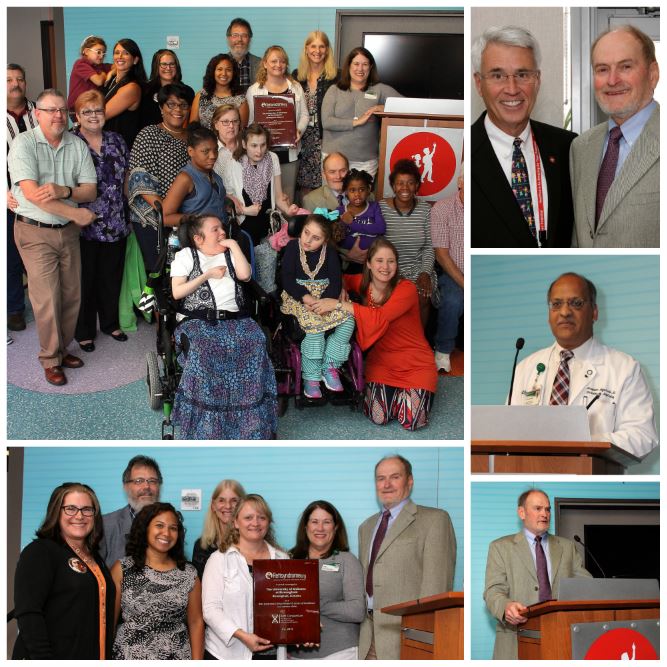 The University of Alabama at Birmingham (UAB) Civitan Rett Syndrome Clinic has received the Center of Excellence award from Rettsyndrome.org, a leading advocacy organization for patients and families affected by Rett syndrome.
The University of Alabama at Birmingham (UAB) Civitan Rett Syndrome Clinic has received the Center of Excellence award from Rettsyndrome.org, a leading advocacy organization for patients and families affected by Rett syndrome.The award was presented at a reception Friday, Sept. 8 at Children’s of Alabama, which was well represented by both Children's of Alabama and UAB leadership.
“We are so grateful for this designation and what it means for the present and future of our Rett syndrome program here at UAB and Children’s of Alabama,” said Mitch B. Cohen, M.D., Chair, UAB Department of Pediatrics and Physician-In-Chief, Children’s of Alabama. “This award sends a message to families that they have a place close to home where they can seek out expert care and cutting edge research.”
Rett syndrome is a neurological disorder seen almost exclusively in females, affecting one in every 10,000-23,000 individuals. It is found in all racial and ethnic groups worldwide.
The Center of Excellence Award was given to the UAB Center and only 13 other Centers in the US. Alan Percy, M.D., who treats patients at Children’s of Alabama and is the director of the UAB Civitan Rett Syndrome Clinic, was one of the first physicians to recognize Rett syndrome (RTT) in the United States. He is the Principal Investigator of the Rett syndrome natural history study in which all Centers of Excellence now participate. Percy is an internationally renowned researcher of Rett syndrome and has more than 30 years of experience in pediatric neurodevelopmental disorders. He established centers at UAB/Children’s and the Baylor College of Medicine in Texas.
In 1999, a decade-long search for the genetic basis for Rett syndrome succeeded in identifying mutations in the MECP2 gene in girls fulfilling the criteria for the syndrome. This discovery allowed confirmation of clinical diagnoses and the development of genotype-phenotype correlations. Research at UAB/Children’s is now examining the molecular genetics of children who have features of Rett syndrome but do not meet all diagnostic criteria.
Patients with Rett syndrome tend to have small hands and feet and a deceleration of the rate of head growth. Repetitive stereotyped hand movements, such as wringing and/or repeatedly putting hands into the mouth, are common. Gastrointestinal disorders and seizures are also frequently seen. Patients typically have no verbal skills, and about 50 percent of affected individuals do not walk.
Survival into adulthood is now expected barring other illnesses or serious physical complications. Girls and women with Rett syndrome can be expected to demonstrate a full range of emotions and enjoy satisfying social, recreational and educational experiences at home and in the community.
Rettsyndrome.org is a national organization working to accelerate research to cure Rett syndrome and empower families with information, knowledge and connectivity. Since 1998, Rettsyndrome.org has invested more than $41 million in Rett syndrome research.